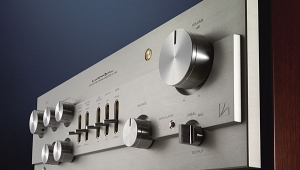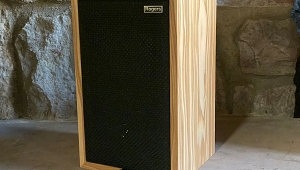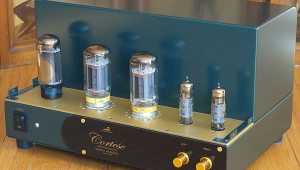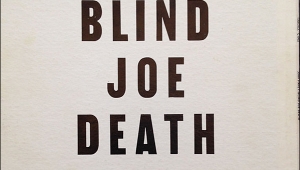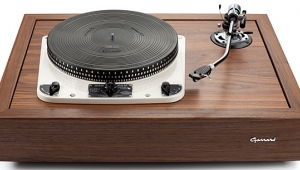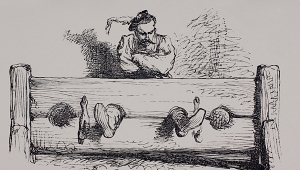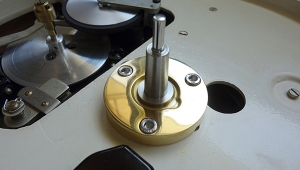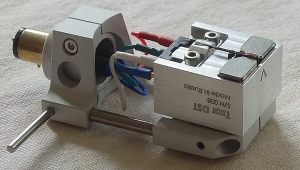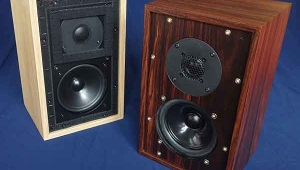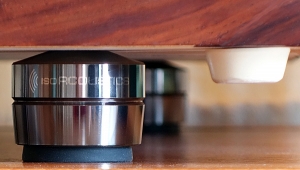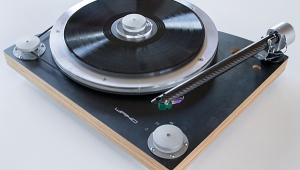| Columns Retired Columns & Blogs |
Listening #3 Page 3
Real Music
Now, since I'm writing this at Christmastime, and because, deep down, I really am the kind of guy who sees a half-full glass wherever he goes (and then, of course, empties it), let me bring to your attention five albums of real, bona fide, artistically legitimate, fun-to-listen-to, honest-to-God great music that also happen to sound at least as good as any of the above. Please note that these records contain normal, accessible music—I'm not here to convince you that I'm too cool to listen to anything other than snuff rock, Peruvian mummy chants, or John Cage—as written and performed by people of whom the average record buyer has indeed heard, and all are on major record labels. Most of this stuff is also fairly easy to find at reasonable prices.
Now, since I'm writing this at Christmastime, and because, deep down, I really am the kind of guy who sees a half-full glass wherever he goes (and then, of course, empties it), let me bring to your attention five albums of real, bona fide, artistically legitimate, fun-to-listen-to, honest-to-God great music that also happen to sound at least as good as any of the above. Please note that these records contain normal, accessible music—I'm not here to convince you that I'm too cool to listen to anything other than snuff rock, Peruvian mummy chants, or John Cage—as written and performed by people of whom the average record buyer has indeed heard, and all are on major record labels. Most of this stuff is also fairly easy to find at reasonable prices.
Mendelssohn: String Quartets, The Eroica Quartet, Harmonia Mundi USA 907245
As someone whose hobby seems stuck at the altar of the great recordings of the late 1950s and early 1960s—not without reason, of course—I'm happy to say that the finest chamber-music recording I've ever heard was made in 1998, by a group of musicians who are apparently at the peak of their form. (Their Schumann disc of last year was equally thrilling, musically, if not quite as good a recording as this one.) The Eroica Quartet pays homage to a golden age of a different sort, given their self-directed roles as period (ie, gut string) players, and this recording does justice to their gorgeous tone, not to mention their vigorous and fresh-sounding performances.
The Beatles: Anthology 3, Capitol CDP 8 34451 2
I'm reluctant to recommend anthologies over original albums, but Anthology 3 is a different case: alternate performances of well-known songs, mixed in a modern setting from the original—and mostly quite good—studio tapes. Though the quality varies somewhat, and even the best of the original tracks are a bit over-compressed, some of these songs sound startlingly present and real, especially "Good Night," "I'm So Tired," and a lovely version of "The Long and Winding Road," minus Phil Spector's awful string and choir arrangements. Engineer Geoff Emerick deserves a knighthood for this.
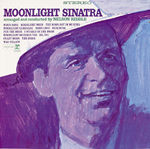 Frank Sinatra: Moonlight Sinatra, Reprise 1018
Frank Sinatra: Moonlight Sinatra, Reprise 1018
The concept, if you want to call it that, is hokey: a bunch of songs that all have "moon" in their titles. But the execution is superb, thanks in part to Nelson Riddle's fine arrangements. Best of all, Sinatra's voice sounds less baggy here than on many other of his Reprise-era albums. "Oh, You Crazy Moon" is especially great: more swing than swagger, for once.
And the sound? Unbelievably good. In fact, this album brings me as close to the "demo disc" experience as I ever come. Thankfully, the music on it is worth the ride.
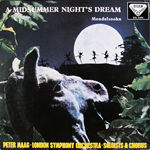 Mendelssohn: A Midsummer Night's Dream, Peter Maag, London Symphony Orchestra, Decca SXL 2060 (also available on a reissue LP from Speakers Corner)
Mendelssohn: A Midsummer Night's Dream, Peter Maag, London Symphony Orchestra, Decca SXL 2060 (also available on a reissue LP from Speakers Corner)
There are lots of capable performances of this music in the catalog, many of which offer good sound as well—but this one rings both bells in a way that few others do. Despite a few tentative bars, the playing is precise and assured, and the orchestra bends easily to conductor Maag's vigorous and witty point of view. The instrumental sound is of the highest caliber in every way, the singing only slightly less so.
This recording is also available on an easy-to-find London Stereo Treasury Series LP (STS 15084), and apart from a curious bit of center-fill vagueness (oh, hell, now they've got me doing it), it sounds every bit as good as the original. Yes (he said wearily), the trains running underneath the hall are clearly audible on both versions.
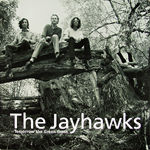 The Jayhawks: Tomorrow the Green Grass, American Recordings 43006-1>
The Jayhawks: Tomorrow the Green Grass, American Recordings 43006-1>
This 1994 release was the last Jayhawks album featuring Mark Olson as co-singer and -writer alongside present frontman Gary Louris, and while the group remains vital, Tomorrow the Green Grass was the last time their vocal harmonies had this kind of magic: Every line is so fresh and interesting that no one emerges as the "main" melody (think: American Beauty-era Grateful Dead). The 13 songs on the easy-to-find LP wed impressionistic lyrics with country, folk, and middle-American rock touches, but unlike many of the Jayhawks' rootsy contemporaries, the playing is competent, and the recording is free of posing and pretension: If anything, this album feels friendly.
The recording itself is superb, thanks no doubt to the fine ears of producer George Drakoulias (Tom Petty's recent output has gained from his touch, too): Every instrument sounds like itself, and the voices are so there it's almost scary. Why can't everyone make records this good?
Honorable Mentions: A few spots of tape overload prevent me from adding to this list the great Du Pré/Barbirolli recording of Elgar's Cello Concerto (EMI ASD 655), but even if it sounded like mud, that record would still belong in everyone's collection. The John Culshaw production of Georg Solti's recording of Wagner's Ring cycle (London OSA 1309, et al) deserves every accolade heaped upon it, as does that other Wagnerian effort, The Very Best of Roy Orbison (Monument SLP 18045).
And believe it or not, the very best recording ever made of a rock band with a symphony orchestra—for those whose lives seem incomplete without knowing this—is in fact a bootleg, albeit an easy one to get hold of: Delicado (Lobster CD012), an unofficial document of a one-off Procol Harum concert at the Hollywood Bowl with a pre-Salonen L.A. Philharmonic and the Roger Wagner Chorale, recorded in September 1973. Apparently taped straight off the mixing board (people who were there say the live sound was in fact horrid), the only sonic flaw is that a microphone was apparently too close to the orchestral percussion players, and so one cymbal in particular makes its existence known a little too often.
Otherwise, this is another startlingly real-sounding disc. The performances are superb all around, and the arrangements are incandescent: "A Christmas Camel," uninspired in its original incarnation of self-conscious Dylanizing, here becomes part oratorio, part sea-chantey, and their last big hit, "Conquistador"—dedicated to "any American-Mexicans in the audience"—sounds more vigorous than usual. This one pops up on eBay now and then, and it's worth the effort if you enjoy 1970s art rock in general or Procol in particular.
The Moral of the Non-Story
Most people prefer good sound over bad, and I'd be lying if I said I don't go out of my way now and then to play things that make my system sound impressive and real. If I had a good car and the opportunity arose to take it to the track or try it on a skidpad, I'd do it—every now and then. But most of the time I drive on real roads, and I have a destination in mind.
I got into this hobby a long time ago, solely because I spent almost all my free time listening to records. Along the way I started hanging out with audio enthusiasts who punctuated every get-together with flowery, ostentatious toasts "To Music!"—and then refused to listen to anything on their systems that wasn't either one of the above-mentioned stinkers or something that they considered to be of Reference Quality. Those people wouldn't waste their time with classical recordings on Columbia (too bright), Deutsche Grammophon (too multimiked and bright), or anything at all from the mono era, which means they cut themselves off from a huge chunk of their recorded heritage.
I'm sorry, but listeners who would turn up their noses at Leonard Bernstein, Carlos Kleiber, and Wilhelm Furtwängler in favor of a more or less steady diet of Frederick Fennell and Eiji Oue are not music lovers but ignoramuses—and in saying so I mean no disrespect for Fennell or Oue. (In case you think I'm letting the Flat-Earthers off the hook, make no mistake: They were as bad in their own way. For a while, it seemed as though all they were allowed to listen to was Ben Sidran—whose music is just this side of The Sheffield Track Record, if you ask me.)
As I said, it took a while, but I found my way again. I'll probably always appreciate good sound, but good music remains more important, and good music must and will always determine my listening habits. That's important when it comes to evaluating audio equipment, too: The better component or system will always be the one that delivers the deepest emotional or intellectual response to the music—but if the music is junk, or if it's some tired old demo disc that's been trotted out over and over and over again, there can be no response but boredom or disgust. Life is too short.
- Log in or register to post comments

